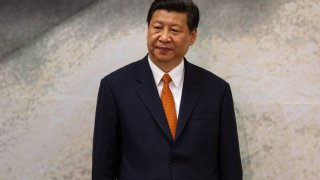How to Beat China in the Quest for AI Dominance
The next administration must recognize that getting ahead in the AI race will both protect U.S. national security and stem the global spread of authoritarianism.
In August 2023, the Biden administration restricted investments in countries of concern and cracked down on illegal trade to stop U.S. emerging technologies like artificial intelligence (AI) from bleeding at the hands of foreign adversaries. However, an attempted hack of OpenAI by the Chinese-based hacker group SweetSpecter last month indicates that the incoming Trump administration will need to reinforce and expand efforts to ensure the United States wins the AI race.
AI will be “a crucial component of economic and military power in the near future,” Stanford University’s AI research center succinctly stated in its 2023 AI index report. AI tops both the White House’s list and the Defense Department’s list of critical and emerging technologies necessary for U.S. national security. China, likewise, recognizes AI as one of the “future industries” that will power its economy.
Today, China exports AI technology to nearly twice as many countries as the United States, focusing on autocracies and weak democracies. In doing so, China will spread its ideology and facilitate the adoption of techno-authoritarian practices, enabling state control over its population and undermining democracy around the world. Likewise, China has begun exporting facial-recognition AI—technology it uses to support its own surveillance state. Beijing’s authoritarian-minded partners also want to use that technology to control their populations in the face of historic unrest and low economic performance.
While most assessments place the United States ahead in the AI race due to its superior workforce and data processing infrastructure, China could quickly close the gap through well-manufactured, well-executed, and state-sponsored intellectual property theft. Indeed, SweetSpecter’s attempted hack of OpenAI is no surprise, given China’s long history of cyber-enabled economic warfare to steal strategically valuable commercial technology.
Cyber theft allows China to leapfrog U.S. innovation and circumvent market competition despite its own deficient research and development capabilities. In a dramatic case uncovered two years ago, Chinese state-backed hackers stole up to trillions of dollars worth of intellectual property on pharmaceuticals, solar panels, advanced manufacturing, and cutting-edge technologies in a years-long campaign. In the case of AI, successful cyber-enabled economic warfare will propel China forward to dominate this emerging technology.
Securing AI innovation is not just a cybersecurity issue. China also uses joint ventures, corporate leadership structures, and technology transfers to siphon U.S. innovation and access data to use in AI training models.
For example, in April 2024, G42, a United Arab Emirates AI company, announced a major partnership with Microsoft to collaborate and expand AI development and the provision of AI-powered services to other countries in the region. While the Biden administration encouraged this agreement to thwart China’s relationship with the company, there are considerable worries that it will actually further facilitate technology transfer to the CCP.
Peng Xiao, G42’s CEO, has “ongoing affiliations [with] problematic PRC-linked entities,” warned the House Select Committee on the Chinese Communist Party in a letter to National Security Advisor Jake Sullivan in July 2024. Xiao also serves as the executive director of Pegasus Technology Beijing, a company whose spyware and surveillance tools are subject to U.S. export controls.
The Biden administration took the first step to address investments in foreign emerging technology with its August 2023 executive order, which restricts investments in semiconductors, quantum computing, and AI in countries of concern. The rules will go into effect on January 2. However, because the executive order narrowly defines countries of concern, such as China, Hong Kong, and Macau, investments like Microsoft’s deal with G42 are not covered. The Trump administration will need to take a hard look at the definitions of covered transactions to ensure they include ventures between U.S. firms and foreign companies whose leadership has close ties to U.S. adversaries.
The Trump administration must also go further by halting the illegal intellectual property trade and smuggling of emerging technology to covered countries. To protect companies against the kinds of attempts OpenAI thwarted, the U.S. government must implement and expand barriers to prevent innovation in critical technologies from falling into an adversary’s hands.
Fortunately, the Biden administration has already begun implementing efforts to prevent and punish the theft of intellectual property and emerging technologies by foreign adversaries. The joint Department of Justice and Department of Commerce Disruptive Technology Strike Force aims to protect “U.S. advanced technologies from illegal acquisition and use by nation-state adversaries.” After one year of effort, the task force has already charged fourteen significant cases.
Despite this promising start, the task force covers only twelve cities. The Trump administration should expand this program, working with Congress to appropriate more funding for Justice and Commerce, with the requirement that it go to developing the Disruptive Technology Strike Force’s resources, manpower, and training in cybersecurity and illicit technology transfer.
Retaining U.S. leadership in AI is a critical mission to protect U.S. national security and stop the spread of authoritarianism. The incoming administration has an opportunity to jump-start these efforts. By thwarting and prosecuting China’s illicit technology acquisition and restricting avenues that Beijing currently exploits to transfer technology under the table, Washington can ensure its dominance in this critical emerging technology. The United States must remain the leader in researching and developing AI lest China and its authoritarian proxies overpower America on the world stage.
Jack Burnham is a research analyst in the China Program at the Foundation for Defense of Democracies (FDD), where he focuses on China’s military, including emerging technologies, force posture, and strategic culture. Follow him on X: @JackBurnham802.
Thomas Carroll is an intern with FDD’s Center on Cyber and Technology Innovation. FDD is a nonpartisan research institute based in Washington, DC that focuses on national security and foreign policy.
Image: Octavio Hoyos / Shutterstock.com.

